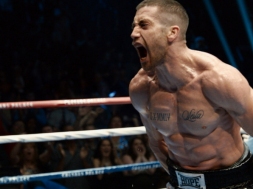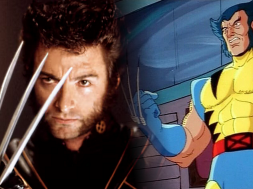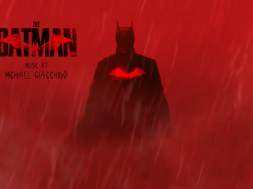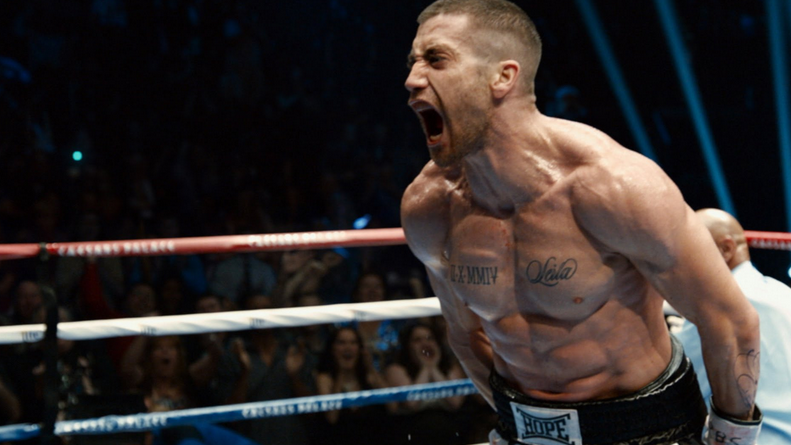
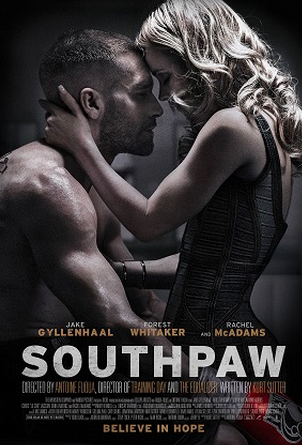
Boxing movies follow very simple conventions. Their stories usually centre on underdogs, often surmised by the reliable cliches ‘rags to riches’ and ‘fall from grace’. It is therefore unsurprising that, as a result of this idiomatic predictability, some see boxing movies, or ones about combat sports in general, as a genre to look down upon. So the question going into Southpaw is: how does it measure up to Raging Bull (1980), Ali (2001), The Fighter (2010), Warrior (2011), and the various Rocky movies? That is, having asked how the film’s leading man measures up after getting into shape.
Southpaw sees actor Jake Gyllenhaal star as Light Heavy-Weight Champion Billy Hope. Supporting roles feature Rachel McAdams, Forest Whitaker, Naomie Harris, 50 Cent/Curtis Jackson and Oona Laurence, with Antoine Fuqua as director. The story is simple enough as well. Billy is an orphan brought up in social services; boxing was his way out. Following a tragedy, Billy loses it all and has to get it back in the only place he knows he can: the ring.
The tragedy is twofold. Early in the film Billy’s wife Maureen (Rachel McAdams) is killed. With the loss of his love, Billy’s life spins out of his control, with further losses that include his title, his home and the custody of his daughter Leila (Oona Laurence).
 The acting in this movie is without flaw. Jake Gyllenhaal has taken on a number of interesting roles, many that may be described as a typical of a ‘leading man’. Compared to the likes of Nightcrawler (2014), End of Watch (2012), Source Code (2011), Love and Other Drugs (2010), Zodiac (2007) and Brokeback Mountain (2005), a role like Southpaw might not seem his most challenging onscreen ordeal – training regiment aside. That said, Billy Hope is not always easy to like. The fact that Jake Gyllenhaal manages to make him sympathetic is an achievement, and even more so in light of the character’s limited communication skills.
The acting in this movie is without flaw. Jake Gyllenhaal has taken on a number of interesting roles, many that may be described as a typical of a ‘leading man’. Compared to the likes of Nightcrawler (2014), End of Watch (2012), Source Code (2011), Love and Other Drugs (2010), Zodiac (2007) and Brokeback Mountain (2005), a role like Southpaw might not seem his most challenging onscreen ordeal – training regiment aside. That said, Billy Hope is not always easy to like. The fact that Jake Gyllenhaal manages to make him sympathetic is an achievement, and even more so in light of the character’s limited communication skills.
Rachel McAdams is also on great form as Billy’s wife, Maureen. Sitting at the side lines, Maureen worries about the long term effects of Billy’s carreer. A brawler, his style involves taking a beating before giving one – tiring his opponent out and getting himself into the kill zone, as it were. Yet Maureen is not idly wringing her hands. Feisty and whip-crack smart, she makes her case and wins him over before her death. Also, McAdams and Gyllenhaal demonstrate an intimacy that is remarkable. In the course of the movie it is revealed that she was brought up in care alongside him. Yet even before that, it is hinted at and the actors make the long-standing affection abundantly clear.
My only complaint is that McAdams isn’t onscreen long enough, which can be said still more of Naomie Harris. All the women in this film are excellent, including the young Oona Laurence.
Getting his daughter back involves a number of steps including paid employment and making modifications to his aforementioned technique. For this, he seeks the help of trainer Titus ‘Tick’ Wills (Forest Whitaker). Billy is eventually given the chance to claw back former status, following an exhibition match. It is here that critic Robbie Collin has asserted the film becomes problematic. At the gym, Billy begins giving back to the sport that 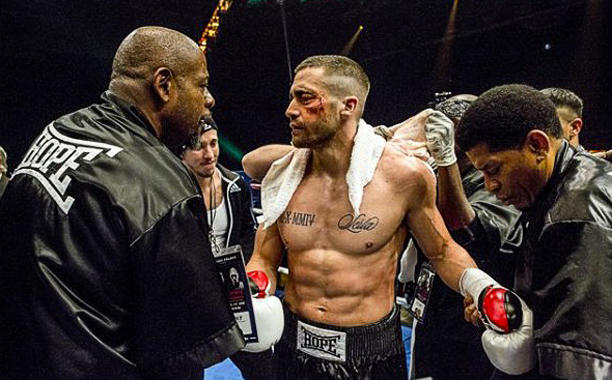 once made him, interacting with young men that are growing up in circumstances comparable to his own. For Collin, the film drops the “interesting plot threads” it took up at Tick’s gym when Billy takes his chance to reclaim his former fortune and glory.
once made him, interacting with young men that are growing up in circumstances comparable to his own. For Collin, the film drops the “interesting plot threads” it took up at Tick’s gym when Billy takes his chance to reclaim his former fortune and glory.
Watching the movie, I too wanted to know more about those characters at the gym. I never got the sense they were exploited in any way. It is true that Billy takes his chance with a jarring suddenness, but it serves to emphasise the desperation of a man with limited options and skills. He can’t do anything else.
It is also worth addressing ‘the big fight’ itself. Many have termed Billy’s return to the ring an act of redemption. I mostly agree. However, caution should be exercised while applying that term. To be understood in a reductive sense, one tantamount to absolution, overlooks the scene’s emotional baggage. Billy blames himself for the death of his wife, whose absence haunts hm, as it does for most of the film. Consequently, the blood letting is not so much an act of penance or payment, so much as a reminder of an open wound.
Southpaw is a melodrama that never lets up. From the moment the film started I was in and felt drained by the end. For that, it might be a film that requires an audience be in a certain mood but, faults notwithstanding, it is an immense experience, one not to be missed.
Intense and involving.
